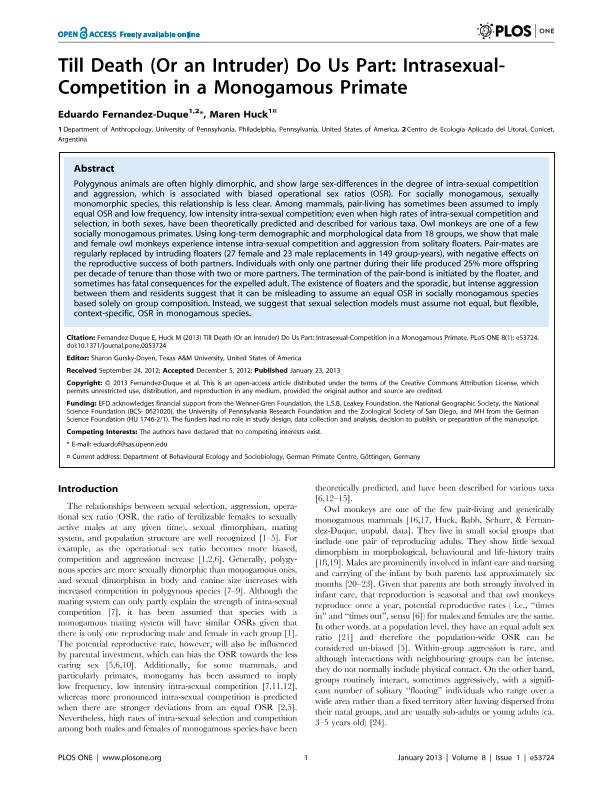Mostrar el registro sencillo del ítem
dc.contributor.author
Fernandez Duque, Eduardo

dc.contributor.author
Huck, Maren
dc.date.available
2016-01-06T18:18:32Z
dc.date.issued
2013-01
dc.identifier.citation
Fernandez Duque, Eduardo; Huck, Maren; Till Death (Or an Intruder) Do Us Part: Intrasexual-Competition in a Monogamous Primate; Public Library of Science; Plos One; 8; 1; 1-2013; 1-5
dc.identifier.issn
1932-6203
dc.identifier.uri
http://hdl.handle.net/11336/3392
dc.description.abstract
Polygynous animals are often highly dimorphic, and show large sex-differences in the degree of intra-sexual competition and aggression, which is associated with biased operational sex ratios (OSR). For socially monogamous, sexually monomorphic species, this relationship is less clear. Among mammals, pair-living has sometimes been assumed to imply equal OSR and low frequency, low intensity intra-sexual competition; even when high rates of intra-sexual competition and selection, in both sexes, have been theoretically predicted and described for various taxa. Owl monkeys are one of a few socially monogamous primates. Using long-term demographic and morphological data from 18 groups, we show that male and female owl monkeys experience intense intra-sexual competition and aggression from solitary floaters. Pair-mates are regularly replaced by intruding floaters (27 female and 23 male replacements in 149 group-years), with negative effects on the reproductive success of both partners. Individuals with only one partner during their life produced 25% more offspring per decade of tenure than those with two or more partners. The termination of the pair-bond is initiated by the floater, and sometimes has fatal consequences for the expelled adult. The existence of floaters and the sporadic, but intense aggression between them and residents suggest that it can be misleading to assume an equal OSR in socially monogamous species based solely on group composition. Instead, we suggest that sexual selection models must assume not equal, but flexible, context-specific, OSR in monogamous species.
dc.format
application/pdf
dc.language.iso
eng
dc.publisher
Public Library of Science

dc.rights
info:eu-repo/semantics/openAccess
dc.rights.uri
https://creativecommons.org/licenses/by/2.5/ar/
dc.subject
Monogamy
dc.subject
Aotus
dc.subject
Pair Bond
dc.subject
Intrasexual Competition
dc.subject.classification
Zoología, Ornitología, Entomología, Etología

dc.subject.classification
Ciencias Biológicas

dc.subject.classification
CIENCIAS NATURALES Y EXACTAS

dc.title
Till Death (Or an Intruder) Do Us Part: Intrasexual-Competition in a Monogamous Primate
dc.type
info:eu-repo/semantics/article
dc.type
info:ar-repo/semantics/artículo
dc.type
info:eu-repo/semantics/publishedVersion
dc.date.updated
2016-03-30 10:35:44.97925-03
dc.journal.volume
8
dc.journal.number
1
dc.journal.pagination
1-5
dc.journal.pais
Estados Unidos

dc.journal.ciudad
San Francisco
dc.description.fil
Fil: Fernandez Duque, Eduardo. Consejo Nacional de Investigaciones Científicas y Técnicas. Centro Científico Tecnológico Nordeste. Centro de Ecologia Aplicada del Litoral (i); Argentina
dc.description.fil
Fil: Huck, Maren. University of Pennsylvania; Estados Unidos
dc.journal.title
Plos One

dc.relation.alternativeid
info:eu-repo/semantics/altIdentifier/url/https://journals.plos.org/plosone/article?id=10.1371/journal.pone.0053724
dc.relation.alternativeid
info:eu-repo/semantics/altIdentifier/doi/http://dx.doi.org/DOI:10.1371/journal.pone.0053724
Archivos asociados
